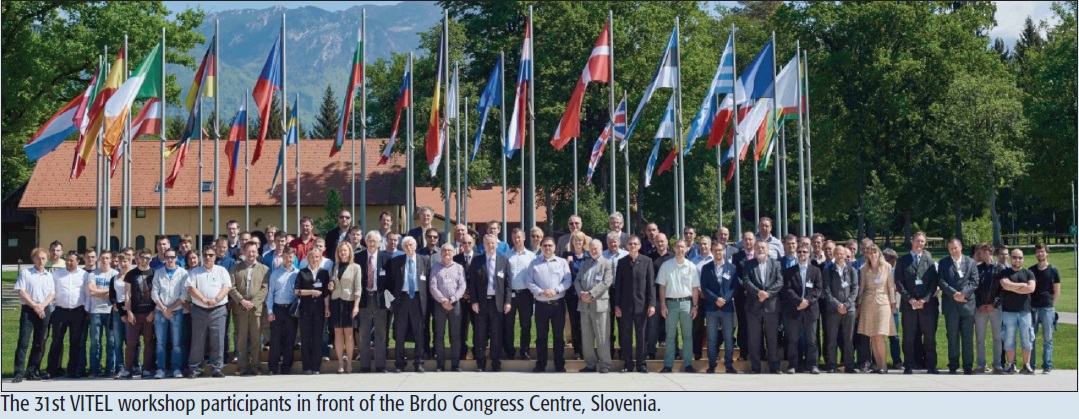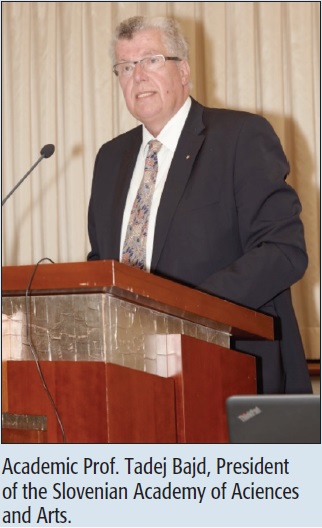
VITEL 2015, the 31st workshop on telecommunications, took place at the Congress Centre Brdo pri Kranju in Slovenia 11–12 May 2015. A Program Committee, chaired by Bostjan Tavcar, selected ‘Critical Infrastructure and ICT’ as a theme for the workshop. An event was organized by the Slovenian Electronic Communications Society, a member of the Electrotechnical Association of Slovenia, and sister society of the IEEE Communications Society. A group of 35 authors and co-authors prepared 22 papers, and more than 130 participants attended the workshop. A round table, chaired by Nikolaj Simic, president of the organizing committee, was dedicated to security threats in critical infrastructure and their consequences on state security. Members of the round table discussed facilities and services crucial for the country.
At the VITEL 2015 workshop, several lecturers pointed out a significant impact of discontinuity of ICT activities and operation on national security, the economy, and critical societal functions, including health, safety, personal security, and social welfare.
The European Union Council Directive on the identification and designation of European Critical Infrastructures (ECI) and the assessment of the need to improve their protection 114/2008/EC requires implementation of relevant legal measures from the member states. Regarding the action priorities or direct impact on other sectors of critical infrastructure in the EU, critical infrastructure was classified according to priority order, where information and communication support was listed as the second priority.

Thus, the VITEL 2015 workshop focused on ICT systems as important tools for the protection of critical infrastructure. Bostjan Tavcar, who in addition to serving as president of the workshop program committee also is the head of the Administration of the Republic of Slovenia for civil protection and disaster relief, opened the workshop with his introductory speech. Then the attendees were honored with the remarkable opening speech of academic professor Tadej Bajd, president of the Slovenian Academy of Sciences and Arts.
In the two days of the VITEL 2015 workshop lecturers from public institutions, research institutes, universities, and private companies, the following topics were addressed:
- A critical infrastructure for providing IT and telecommunications services and relevant solutions.
- Determination of cyber threats and vulnerabilities of critical infrastructure.
- Provision of telecommunications and information services in natural disasters and other emergency situations. An audience heard about actual experiences from infrastructure operators, e.g. telecoms, broadcasters, the electric power industry, and a National protection and rescue directorate from Croatia in major natural and other disasters. Cases included sleet (freezing rain) in Slovenia in February 2014 and floods in the Northern Balkans in May and June 2014.
- The role of the State and civil protection service in providing minimal functions of public telecommunications networks in natural and other disasters. Lecturers and the audience had a fruitful discussion on the question of how the Administration for Civil Protection and Disaster Relief of the Republic of Slovenia and local civil protection organizations could assist in providing telecommunications and information services in such accidents.
- Levels of reliability, availability, and security provided by new technologies.
- Functioning of the emergency call service (112) and critical infrastructure in major natural and other disasters.
- The choice of LTE as the telecommunications platform for professional radio communications.
- Development of radio networks (e.g. DMR) for the critical communications.
- The role of the national regulator in assuring non-disturbed provision of ICT services in the event of natural and other disasters. A lecturer from the Agency for Communication Networks and Services from the Republic of Slovenia focused on the question whether the Electronic Communications Act needs to be reworded or changed in relation to critical infrastructure.
- DNS as critical infrastructure. A lecturer from the Academic and Research Network of Slovenia showed how DNS (domain name server) has been involved in national critical infrastructure and what approach and measures should be taken for risk management of DNS at the national ccTLD Registry.

In addition to the aforementioned topics attendees heard several lectures related to the private software and hardware solutions used for critical infrastructure management.
Attendees finished the two days of very interesting and fruitful discussions with the conclusion that a proper functioning of the ICT in case of critical situations is the basis for all other industries, and should be given more value in the future.
After the great success of the 31st workshop on telecommunications, we are looking forward to the 32nd workshop, which will be held from 16–17 May, 2016 at the Brdo Congress Centre, Brdo pri Kranju, Slovenia. The title of the next workshop is ‘Smart Networks of the Information Society’. You are kindly invited!